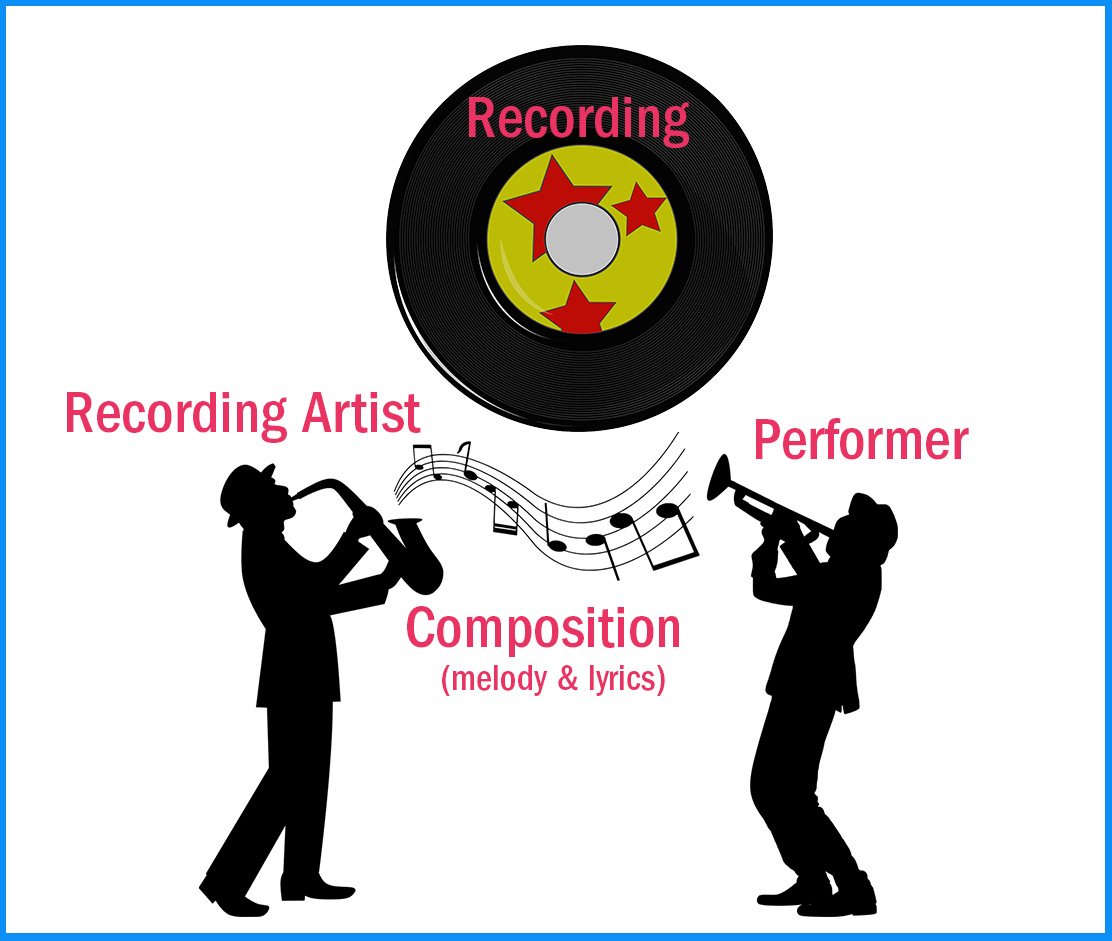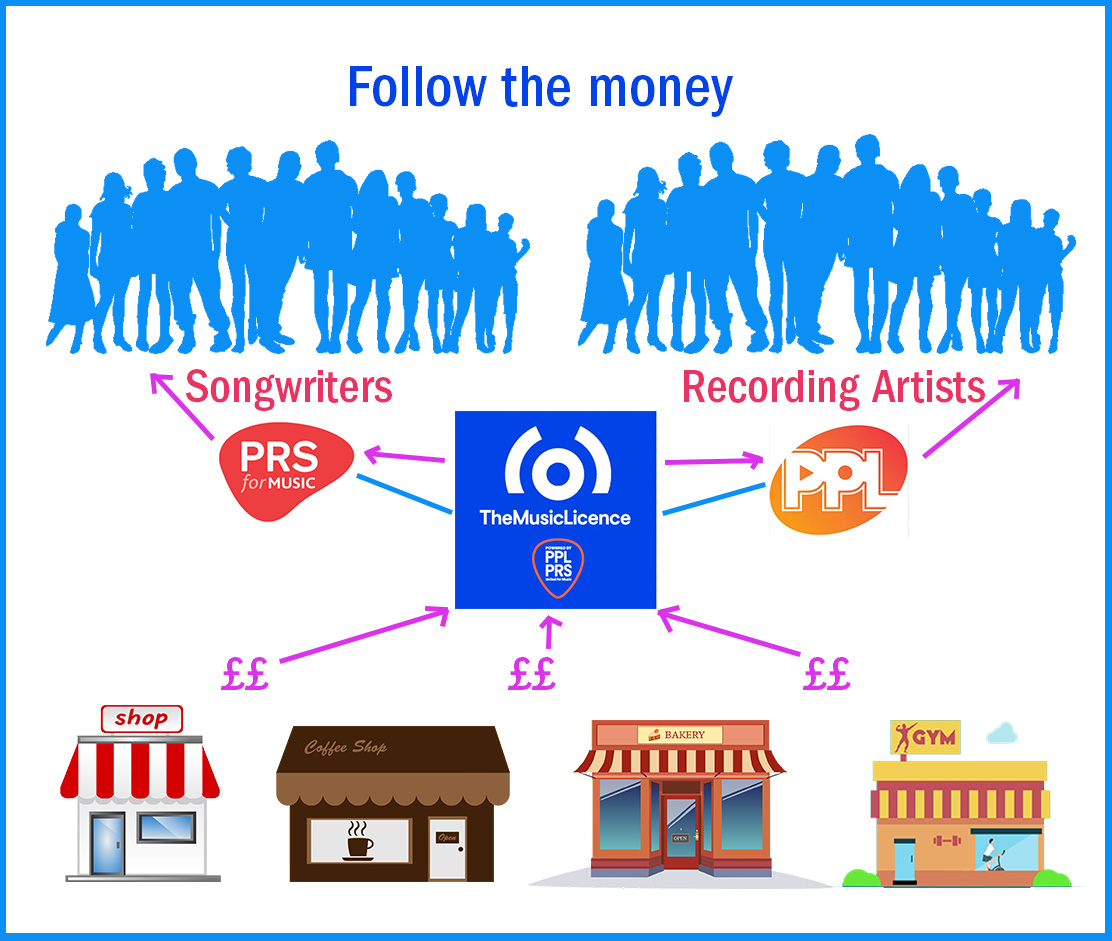What is the Music Licence and who needs one?
If you play background music in your shop, cafe, restaurant, salon, gym - indeed any business premises visited by the public (aka your customers) - you may have received an invoice from the issuers of something called The Music Licence, asking for you to pay for the right to play that music. Alternatively you may have been paying for a music licence, happily or resentfully, for many years but always wondered why and if you had to.
Whatever your particular situation you may well have asked yourself one or more of the following questions?
- Why do I have to pay for a music licence? I already pay for Apple Music / Amazon Music / Spotify so why do I have to pay again?
- Who issues the Music Licence and what happens to the money?
- Can I play music on my business premises legally without a licence?
- How do PRS/PPL decide what to charge my business for The Music Licence?
This article demystifies music licensing and hopefully answers those questions without delving too deeply into the complex realm of Copyright law.
In essence you must pay for The Music Licence if:
- You play music on your U.K. business premises, for your customers or employees to hear AND...
- Any of the music you play (even one track!) is controlled for PUBLIC PERFORMANCE by the Performing Rights Society (aka the PRS) or by Phonographic Performance Limited (aka the PPL).
More of what that means later but in practice that means pretty much 95%+ of the world's most popular music, or put another way, all 'hit', commercially released songs recorded by major artists. WHY? Well it takes a little explaining but the simple version is this. When a recording of a song, whether a CD, vinyl record, download or stream, is played to the public, meaning not played solely for your personal consumption, in legal terminology, it is PERFORMED and in order to PERFORM a recording of a song you must have been granted the RIGHTS to do so from the COPYRIGHT OWNERS. Important to npte, there are 2 COPYRIGHTS in any recording of a song, one being the actual RECORDING (sometimes called the MASTER RECORDING) and the other the SONG or COMPOSITION (basically the melody and lyrics), that has been recorded. So potentially 2 COPYRIGHT OWNERS must grant this right to you.
When you buy a CD or download or subscribe to a music streaming service you are technically being granted the right to play FOR PERSONAL CONSUMPTION ONLY the RECORDING by the Record Label (and their contracted recording artist in the process) and the SONG by the MUSIC PUBLISHER controlling the SONG (and theoir conracted songwriter/composer in the process).
To PERFORM the recording in public you need the RECORD LABEL / RECORDING ARTIST to grant the rights to you and to PERFORM the song you need the same from the MUSIC PUBLISHER/ SONGWRITER.

Now it would be logistically difficult, in fact prohibitively so, for every business owner to seek and get approval from every copyright owner and interested party for every recording and song they wished to perform and that is where the COLLECTION SOCIETIES or PERFORMING RIGHTS ORGANISATIONS like the PRS and PPL come in. Performing Rights Society (PRS) is a membership organisation representinmg its members who are the Music Publishers and Songwriters while Phonographic Performance Limited (PPL) members are Records Labels and Recording Artists / Performers.
In order to create a manageable licensing system the Labels and Publishers / Songwriters set up these membership organisations to collect and distribute the money generated from such licensing aka MUSIC ROYALTIES back to the members and to this they agreed that these organisations could issue licences to the business users that covered all their members recordings in the case of the PPL and songs in the case of PRS aka BLANKET LICENCES.

What will I pay for The Music Licence?
So, the Music Licence is a Blanket Licence, or more properly 2 combined Blanket Licences issued by the PRS and PPL and granting the Licensee such as the shop or cafe owner, the Rights to perform the Recordings and Songs of their members. The PRS and PPL issue licences to many different types of bsuinesses for a range of dufferent music usages, from background music in pubs to music featured in TV programmes and films and broadcast by TV channels.
The PRS and PPL are tasked with collecting, policing and managing the system, and with distributing the monies back to the members accurately and fairly. This is challenging for background music because unless the retailer or restaurant is able to submit detailed data on what recordings have been played, the PRS and PPL have no idea who to pay. This can mean that money is distributed imprecisley and this often benefits recordings that are getting high levels of radio airplay because this data is provided by radio stations and used as a crude proxy for distribution from other sources. I can mean that smaller writers and artists do not receive royalties strictly due to them, from background plays.
The Music Licence is not that transparent in our experience when it comes to how they calculate your specific fee. There are different methods it seems by sector, which can include for example square metrage for retail units, number of covers in a restaurant, number of rooms in a hotel but we suggest you push hard for a clear explanantion of how they have arrived at a proposed fee!
Can I avoid paying for The Music Licence?
As we said right at the start, if you play popular music from writer / publisher members of the PRS (or overseas equivalents) and recording artists / record label members of PPL, then you must have a licence by law and if you fail to acquire one the PRS/PPL have statutory powers to penalise you financially.
However there are now music services available to businesses that offer playlists of recordings that are exempt from PRS and PPL fees for a variety of reasons.
- The music may be from writers / recording artists who are not members of a Collection Society, nor signed to a Record label or Publisher that is. Many independent artists do not join these societies because they regard them as restrcitive. In the case of the PRS the membership requires an exclusive arrangement and so limits the members' ability to do licensing deals directly. In the USA these agreements are non-exclusive and so more flexible for members.
- Some music libraries commission their own music and contractually own the copyrights allowing them to licence directly to these music services.
- In the USA especially, artiers and recording artists are allowed to directly licence to these music services.
This means that there are a growing number of credible alternatives to PRS /PPL controlled music and if your business requirements suggest that the relatively high cost of music licences is nopt offset by having access to popular hits then as a business owner yopu moight want to consider these services which you can typically try out with a free trial.
Examples of PRS PPL exempt services are bizzaudio offering a wide range of playlists via its webplayer including modern pop and iChill which specialises in relaxation music for massage, treatments, yoga, spa.

